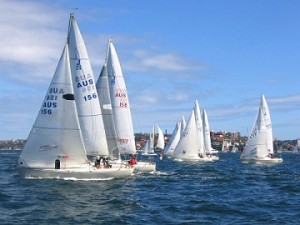 The British Olympic team coach Jim Saltonstall once described yacht racing as the most complex and challenging sport in the world. And at the higher levels, he’s probably right – to rise to the top, elite yacht racers need to combine plenty of manual agility and raw sailing skill with high levels of preparation, intelligence and strategic thinking.
The British Olympic team coach Jim Saltonstall once described yacht racing as the most complex and challenging sport in the world. And at the higher levels, he’s probably right – to rise to the top, elite yacht racers need to combine plenty of manual agility and raw sailing skill with high levels of preparation, intelligence and strategic thinking.
However, we don’t want that to deter you from making your first foray into competitive sailing. Yacht racing is enjoyable for anyone who can sail, and if you have some basic boathandling skills, then it’s very much accessible to you. There are races to suit all skill levels, and there are short and effective yacht racing courses that can quickly get you up to speed and ready to compete.
The ‘Racing Rules of Sailing’ are quite complicated. They’re maintained by the International Sailing Federation, and they’re updated every few years. If you aim to race, you’ll really just need to put the time in to familiarise yourself with the rules. There are several conditions governing right-of-way on the water, and the rules are designed to foster avoidance of collision and capsizing.
Naturally, rules will be extensively covered on any good racing course, and the best people to talk to for rule clarification are yacht racing instructors.
One thing to consider is what kind of race you want to take part in. The four main classifications are: ocean, offshore, inshore and around the world. The basic rule set is similar for each, although rules are tailored somewhat to the nature of the race.
It depends on the race! There are races for both small dinghies and larger vessels. To keep races fair, it’s important that all boats are of a similar size and design. The larger the yacht, the faster it is, as it’s often the surface area of the sail that’s the key factor in yacht speed.
Races are grouped by yacht ‘rating’, which is a number assigned to the yacht according to its size and design. Usually only yachts of a certain rating may compete in any given race.
To enjoyably compete in yacht racing, you will need to have some established general sailing skills. You don’t need to be an absolute expert, but it’s important to have a basic knowledge of sailing, and some experience under your belt on the waves. Something like the RYA Day Skipper course is a good start. And ideally, you’ll have experience sailing the type of yacht that you want to race.
Beyond that, you’ll need race training! A dedicated racing course is your best choice, and should cover enough to turn you into a competent crew member on a racing yacht.
There are many, and it’s not just about your core sailing ability. The longer the race, the more things like preparation, navigation and weather prediction become key factors for success.
Teamwork is hugely important, and the ability to communicate and pull together and work as a unit is essential to yacht racing success.
There are also more advanced skills such as racing strategy, tactics and complex manoeuvres that play large parts in more competitive races.
If you’d like to learn the skills required to compete, we’ll be able to point you to yacht racing courses that can get you quickly up to speed. Yacht racing is exhilarating, and once you’ve had your first taste of it, a thrilling new world of competitive sailing will open up before you.